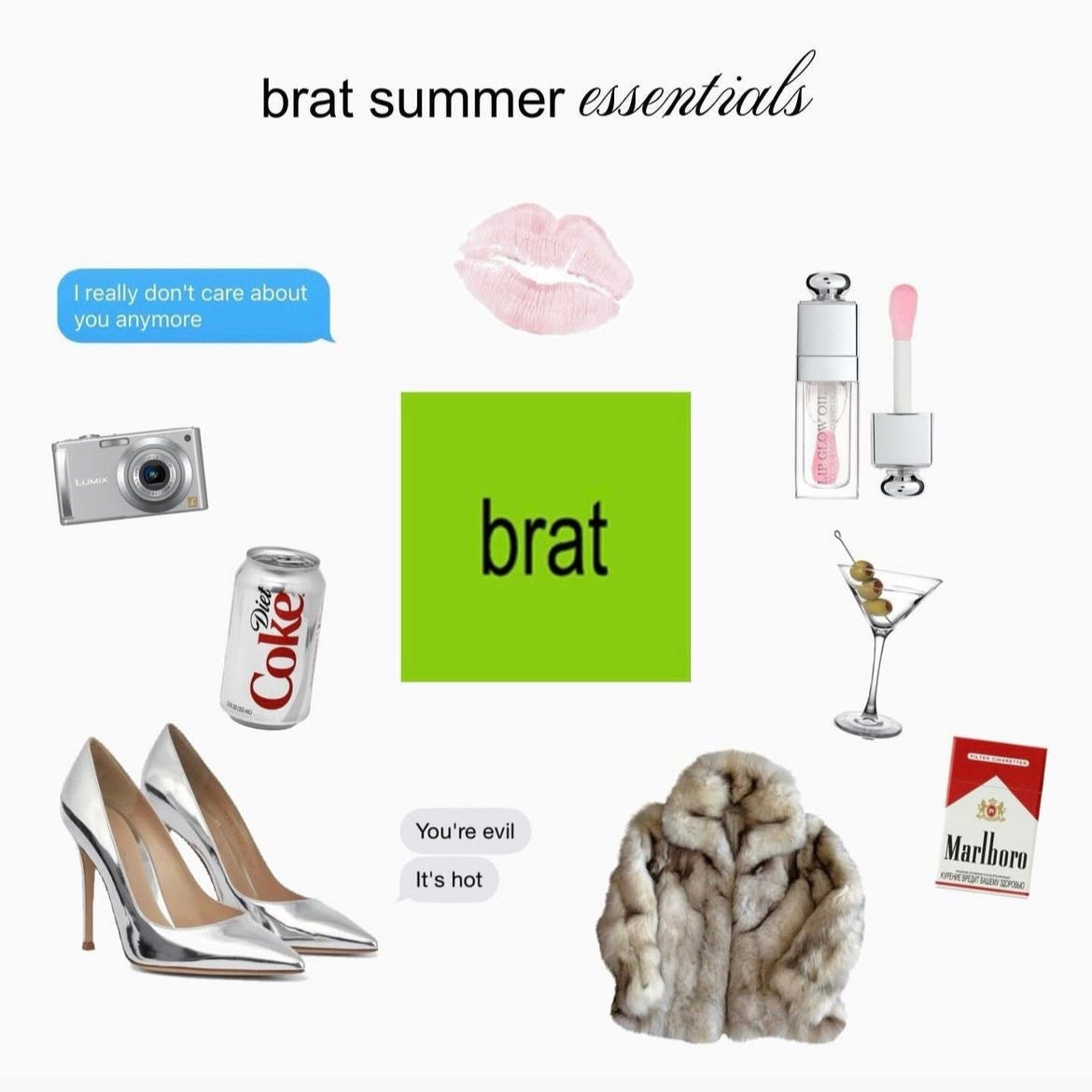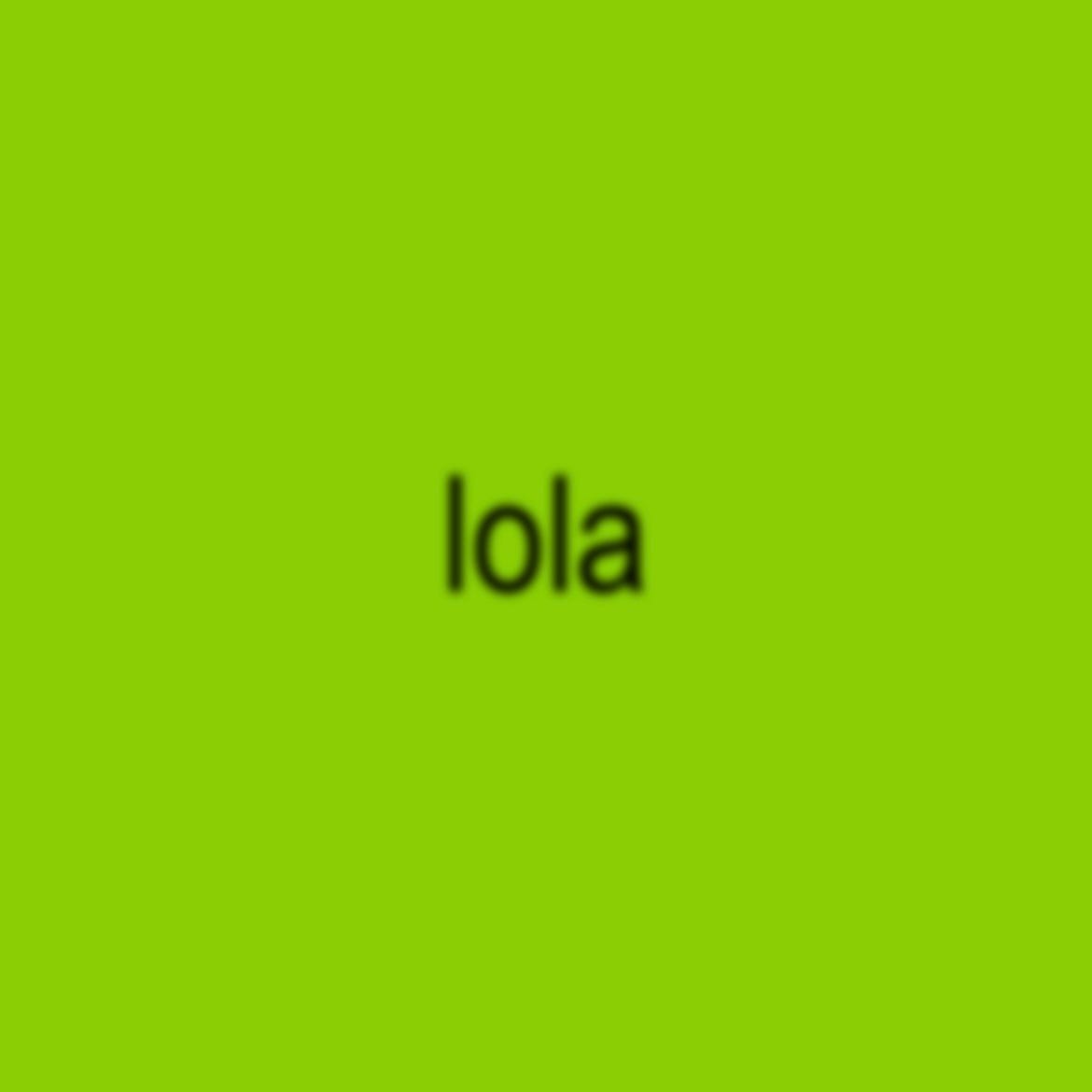"brat girl summer" didn't set the "clean girls" free
to escape curated personas, we need to move away from mood boards and embrace authenticity.
Hello and welcome to my Substack! I’m so happy you’re here. I hope you enjoy my critique on the thing that annoys me the most—internet identities. Please subscribe if you’d like to receive more of my rambles and support me for free. Love ya!!!!
These past years we had monumental summers like the “Hot Girl Summer” or the “Barbenheimer Summer.” This summer was no exception. This summer, we were brats—we had a “Brat Girl Summer.” Charli XCX’s upbeat yet intimate 2024 album “BRAT” paints the image of a party girl. Songs performed in a room filled with sweaty (and probably high) people, promise a good time. So, this summer we donned strappy white tank tops and lit our Parliament cigarettes. We went skiing (if you know, you know), partied, were blunt with our words, and did not care. Our hair was messy and our eye makeups were smugged. This summer was dedicated to having fun and being free. We broke the molds the “clean girl” of Tiktok had set for us years prior. Our looks weren’t close to the conventional good-looking image we once aspired to. We didn’t try like we used to.
Since 2020, the “clean girl” has dominated social platforms with its slicked-back hairstyles, matching yoga sets, matcha lattes, and elaborately put-on “no makeup makeup” looks. Its girlish, minimalist, and luxurious portrayal is the perfect material for Instagram and TikTok. Clean girls emphasize their wellbeing; their lifestyles are meticulously curated from their nail shapes to the trim of their pants. They encapsulate a kind of femininity that is marketable. There’s also a secret side to the clean girl: her life is as chaotic as the average girl's. Beyond her commodifiable lifestyle, the catch to the clean girl is that she hides all her chaos behind the façade of her well-curated life, and we love that. She can be organized and chaotic. She has cracked down on the secret of life.
As I see both of these girls, the brat and the clean girl, pop up on my Instagram feed, I can’t help but wonder: Did we change the game, or merely bend the rules?
“Brat girl” is not an antithesis to internet identities; it’s just a more flexible and comfortable spot in the pool of identities we consume. One should not view it as a new era where freedom is the status quo. Yes, we’re all uniquely messy, but, one fails to realize that anything you can turn into a mood board or hashtag is still part of a curated internet identity. Throughout the summer, I’ve seen numerous posts revolving around the idea of a brat summer. On a sterile white background (reminiscent of the 2019 niche meme era) are PNGs of things people associate with a “brat girl.” All these posts contain the album cover, cigarettes, Y2K-style sunglasses, alcoholic drinks, and none other than Charli XCX. Although the allure of this new identity is a girl who doesn’t care, there’s a concrete image of things one has to possess to become a brat. We’re playing the game under new rules, but the game persists.
What “brat girl summer” promises is an opportunity to embrace your flaws and have the freedom to live your emotions in their full range, rather than break down behind the scenes. Charli XCX defines it as a girl “[w]ho feels herself but maybe also has a breakdown. But kind of like, parties through it.” I have to admit that embracing a “brat girl” lifestyle is like a breath of fresh air—it’s more fun than Pilates and face masks. However, the need to prove and express your freedom is as much of a performance as the clean girl’s carefully curated put-togetherness.
Being messy and marketing your messiness are still calculated choices, helping present yourself in a new light. The freedom “brat girl summer” provides is not the freedom from the shackles of internet identities, but the freedom to get ugly with it. All in all, these two clashing identities still need external validation. We are not shifting to authenticity. The pressure of internet identities is still upon us.
If you can explain a quality someone possesses—being a “brat girl” in this context—through mood boards filled with elaborately curated images and items, there’s something performative about it. That’s what bugs me about “brat girl summer.” It’s tangent to free expression but falls just shortly from it.
Rejecting the “clean girl,” or any other identity, doesn’t free you from the endless scroll of new me’s. You don’t have to create an antithesis identity, you have to explore what you like and don’t like. Escaping the pressure of the digital age’s online identities comes from the understanding that you don’t need to be one thing or the other. Taking time to curate the things you enjoy is brat. I say, go to the club if you want to, but wear those yoga sets you secretly eye.
The bigger issue I wanted to address is my hatred of people’s need to conform to an identity, curate the things they need for said identity, and then market their newfound identity to the world. Pitting these identities together, or giving an absurd name to the things we supposedly enjoy—whether it’s the “thought daughters” who are introspective, or the “dark academia girls” who love Donna Tartt—won’t help us in an era where everyone is yearning for authenticity and belonging at the same time.
From what I gather, the actual point “brat” meant to make is that you get a little nonchalant with it. You don’t carry yourself with the rigidity of a mood board or a hashtag but with your full unapologetic essence.







so REAL
first of all, welcome to substack!
also idk why but there is still something very clean girl aesthetic about the brat summer polyvore-esque graphic. maybe it's all the negative space (i think it is). I loved this post, definitely food for thought. can't wait to see what else you post !! :)